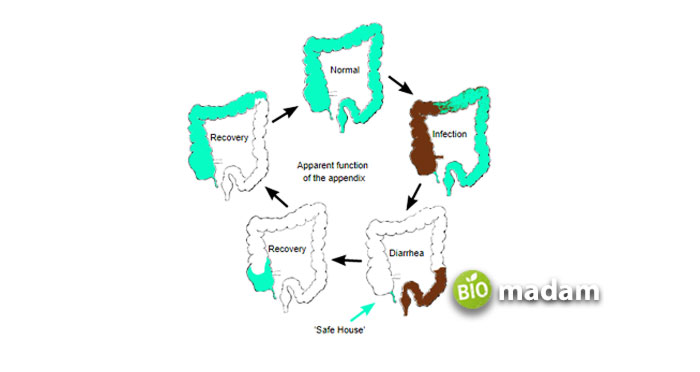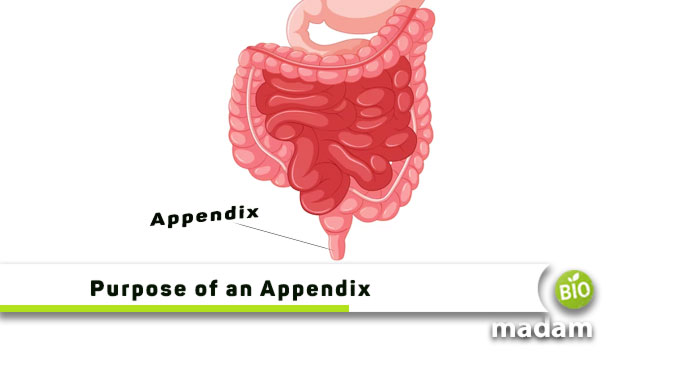When talking about the anatomy and physiology of a human body, the appendix is one of the lesser talked-of organs in it. The main reason for it not being the talk of the town is that it has been thought not to perform any particular function. Thus, the appendix is also considered a vestigial organ. Vestigial organs were useful in ancestral organisms but do not serve any important role in the body now. As the common perception believes that the appendix is an unimportant organ, it falls into the same category. Opposed to popular opinion, the appendix does have a job, after all! Let’s tell you the purpose of an appendix in the body in detail.
What is the Appendix?
The appendix is a thin, short tube extending through the GI tract. It is in the lower right of your abdomen, connected to a region of your large intestine called the cecum. This part of the abdomen is also known as McBurney’s point. The appendix is seen as a finger-like projection coming out of the intestine.
The size of the appendix is between 3-4 inches in length and 0.5 inches in width. The tube becomes narrower as it merges with the cecum at the other end. The walls of the appendix are made of strong muscles that push the material into the cecum. The content usually comprises the mucous secretions of the appendiceal walls. Obstructions in the appendix may prevent it from expelling the secretions into the cecum. A hard piece of fecal matter, known as fecalith, is the most common restriction of the appendix. Moreover, the walls of the appendix may swell, narrowing the organ and impacting the movement of substances. Prolonged issues with expelling materials into the cecum can lead to tissue and organ necrosis due to excess mucous secretions and fluids.
Function of Appendix
Given that removing the appendix does not lead to medical complications, people normally do not care about the role of the appendix. Previously unsure about the function of the appendix in the body, researchers have found out the purposes of an appendix. It is an important organ in the fetus and young adults. Endocrine cells land in the appendix of the fetus in the 11th week. The endocrine cells produce peptide hormones and biogenic amines that control many biological functions. The main role of the appendix lies in humoral and cell-mediated immunity. However, its functions are connected to the digestive system as well.

Role in Immunity
Studies show that the appendix has lymphoid tissues, B-cells, and T-cells contributing to immune function. It also has an evident role in producing immunity to avoid severe infections and diseases, as these are one of the major causes of cancer.
The lymphoid tissues appear in the appendix after birth and reach their highest in the 20s and 30s of the person’s life. They play their role in maintaining immunity and disappear at 60. The appendix contributes to the maturation of B lymphocytes and antibodies such as IgA. Besides manufacturing antibodies and lymphocytes, the appendix also directs the movement of these cells to the target locations.
Role in Digestion
The appendix is fundamental in storing probiotics or good bacteria to improve human gut function. These bacteria protect us from harmful microbes and also facilitate the process of digestion. Sometimes, they might get out of your system because of gastric diseases and upset your gastric system. In such cases, the appendix supplies the body with probiotics to maintain the microbiome.
Appendicitis
Appendicitis is a prevalent health issue related to the appendix. It refers to the inflammation of the appendix due to the blockage of the tube. It may be due to a foreign body or fecal matter. Sometimes, it may also result from a cyst or tumor. It may also swell due to an infection in the body. It is characterized by pain in the lower right side of your abdomen to the navel. You may also experience a swollen belly, loss of appetite, and fever between 99 and 102 F. You must consult your physician as soon as you experience any of these signs or symptoms to find the underlying issue. If it is appendicitis, it must be treated on time to avoid complications.

The Bottom Line
The appendix is a less talked-of human organ but is still an important anatomical and physiological component. It contributes to producing B-cells, T-cells, and lymphoid tissues to boost immunity. They provide the immediate defense to keep the antigens and pathogens out to avoid serious infections. At the same time, the appendix stores good bacteria that keep our gut healthy. They help replenish and regulate the microbiome in a health condition like cholera or dysentery. However, it is safe to remove the appendix if it can cause harm to the body, such as serious appendicitis infection.
FAQs
Does the removal of the appendix affect the immune system?
Studies have shown the role of the appendix in the production of antibodies and other pathogen-fighting cells. Thus, people who do not have an appendix may suffer from health issues more often than those with a healthy appendix.
How big is an appendix?
The appendix is a small organ in the body compared to other integral organs like the heart, lungs, or kidneys. The appendix is a finger-like projection of the cecum and is around three to four inches in length, while the width is only a half inch.
What are the 5 signs of appendicitis?
Sudden, intense pain on the right side of your abdomen is one of the primary signs of appendicitis. Patients may also experience painful urination, constipation, nausea and vomiting, and chills.
What should I eat if I have no appendix?
Removing your appendix can be physically and mentally exhausting, and you might think you cannot eat much anymore. The best approach is to eat fruits and fiber. Furthermore, avoiding processed foods, dairy products, and red meat is better.
Why do appendixes burst?
The appendix may burst if you do not treat appendicitis in time. Appendicitis results from a blockage in the organ or inflammation due to a bacterial infection.
How long is appendix surgery?
The removal of the appendix or appendectomy is decided through the diagnosis based on symptoms and diagnostic tests. The surgery takes around an hour.

Anna has completed her degree in Pharmacy from the University of Hawaii. She is serving as a research assistant in a pharmaceutical company. She had a great interest in writing blogs, traveling to different parts of the US, and trying delicious recipes in her spare time.

